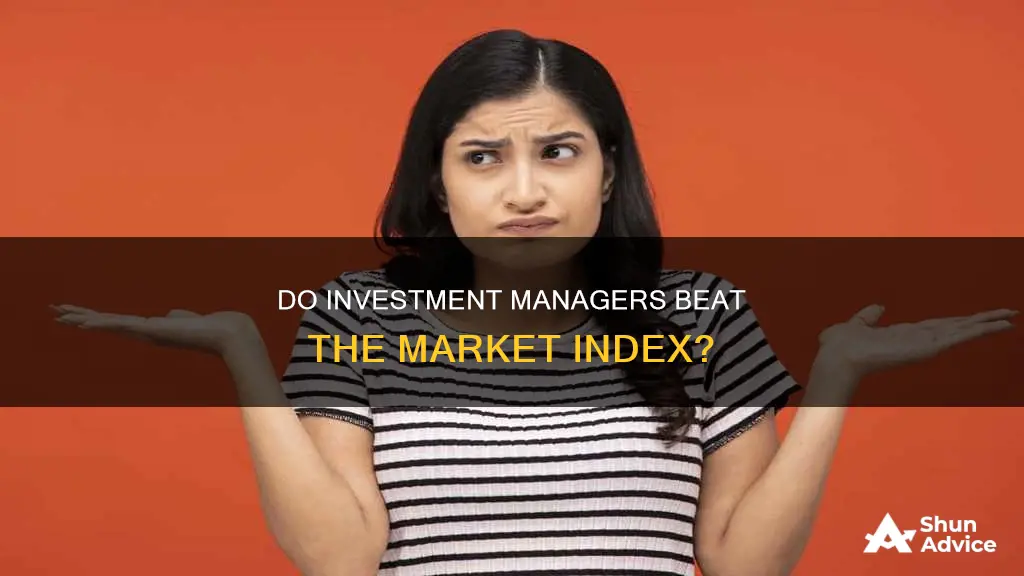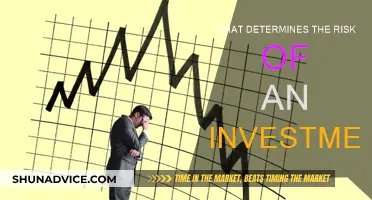
Beating the market is a challenging feat, and the statistics show that only a small percentage of investment managers consistently outperform the index. The question of whether an individual investor can beat the market is a longstanding debate, with various factors influencing the outcome. Investment fees, taxes, and investor psychology are just a few of the barriers that make it difficult for investors to beat the market. While it is possible to take on more risk or utilise superior information to outperform the market, these strategies come with their own challenges and legal implications.
The performance of investment managers is a critical factor in the discussion. Despite their expertise and track records, the majority of professional mutual fund managers fail to consistently beat the market. This has led to a rise in passive investing, with investors opting for low-fee index funds that mirror the overall market performance. However, there are exceptions, and some investment managers have consistently beaten the market, achieving success through their analytical skills and strategies.
How many investment managers beat the index?
| Characteristics | Values |
|---|---|
| Number of actively managed mutual funds that beat the market | 0 out of 2,132 |
| Number of actively managed domestic funds that beat index funds | 1 in 20 |
| Percentage of large-cap funds that lagged a simple S&P 500 index fund over the last 15 years | 92.2% |
| Percentage of mid-cap funds that lagged their benchmarks over the last 15 years | 95.4% |
| Percentage of small-cap funds that lagged their benchmarks over the last 15 years | 93.2% |
| Percentage of active managers of equity mutual funds that beat the S&P 500 in 2022 | 62% |
What You'll Learn

The impact of investment fees and taxes
Investment fees and taxes can have a significant impact on an investor's returns and their ability to beat the market.
Investment fees are a major barrier to beating the market. When investing in an index fund, an investor's fund performance should theoretically match the performance of the index, but in reality, investment fees will be subtracted from those returns, making it difficult to beat the market. For example, if an investor chooses an S&P 500 index fund, their returns will be reduced by the fees charged by the fund. To mitigate this, investors can look for index funds with ultra-low fees, typically ranging from 0.05% to 0.2% per year, which can help them get closer to equaling the market performance.
Taxes are another significant obstacle to beating the market. When investors pay taxes on their investment returns, a substantial portion of their profits is lost. In the US, the capital gains tax rate is typically between 15% and 20%, unless the investor's income is very low. Furthermore, if stocks are held for less than a year, they are often taxed as ordinary income, which can result in a higher tax rate. This reduction in returns due to taxation makes it more challenging for investors to outperform the market.
In addition to fees and taxes, investor psychology can also hinder efforts to beat the market. Many people tend to buy high and sell low due to their inclination to purchase when the market is performing well and sell out of fear when the market declines. While this factor is within the control of the investor, it often works against them.
While it is possible to take on more risk or attempt to gain superior information to beat the market, these strategies come with their own challenges. Greater risk can lead to larger losses, and obtaining superior information may involve illegal insider trading.
Overall, investment fees, taxes, and human emotion work against investors trying to beat the market. As a result, it is more likely that investors will beat the market through luck rather than skill.
The Role of an Investment Manager: Managing Your Money
You may want to see also

The role of investor psychology
Investor psychology plays a significant role in the debate surrounding the ability of investment managers to beat the index. One of the key barriers to outperforming the market is the emotional and psychological aspect of investing.
Human behaviour and emotions often lead to suboptimal investment decisions, with people tending to buy high and sell low. This is driven by the inclination to purchase stocks when the market is performing well and to sell out of fear when the market declines. This behaviour is often driven by a lack of understanding of the disadvantages investors face, as noted by Terrance Odean, a finance professor at the University of California, Berkeley's Haas School of Business.
However, it is possible to mitigate the impact of investor psychology by learning how to analyse stocks and consider a company's potential for future gains. By making informed and rational decisions, investors can avoid the common pitfall of buying and selling at the wrong times.
Additionally, investor psychology can also influence the level of risk investors are willing to take. While taking on more risk can lead to greater returns, it can also result in more significant losses. Thus, understanding and managing one's emotional response to market fluctuations is crucial for making sound investment decisions.
Furthermore, investor psychology can impact the perception of investment fees and taxes. High investment fees can eat into returns, making it more challenging to beat the market. Similarly, taxes on investment returns can reduce profits, and these costs may cause investors to make impulsive decisions.
In conclusion, investor psychology plays a crucial role in the ability of investment managers to beat the index. By understanding and managing their psychological biases, investors can make more informed decisions, improving their chances of success. However, the impact of fees, taxes, and human emotion often works against investors, making it more likely that any outperformance is due to luck rather than skill.
Savings Investment: Choosing Wisely for Your Future
You may want to see also

Taking on more risk
The S&P 500 index is one of the most popular benchmarks of overall US stock market performance. It has historically returned 8-10% per year, which is considered very high. Investors with higher returns than the S&P 500 are said to have beaten the market.
The majority of professional investors are unable to beat the market consistently. Research by S&P Dow Jones Indices found that 88.99% of large-cap US funds underperformed the S&P 500 over ten years. As a whole, 78-97% of actively managed stock funds failed to beat the indexes they were benchmarked against over the same period.
Hedge funds, which often use complicated strategies to achieve better returns than the market, also tend to underperform. In 2016, for example, the S&P 500 returned 85.4%, almost four times as much as the average return of hedge funds, which was 22.04%.
Regular investors have some advantages over professionals when it comes to beating the market. They do not have to pay management fees, only trading commissions and taxes. They can also invest in small- and mid-cap stocks, which may offer higher returns.
However, taking on more risk is not the only factor that can impact an investor's ability to beat the market. Other factors include investment fees, taxes, and investor psychology.
Designing Optimal Portfolios: Understanding Investment Policy Statements
You may want to see also

Possessing superior information
One way to beat the market is to have superior information. While it is difficult for individual investors to possess superior information unless they are company insiders (and trading on nonpublic information is illegal), superior information can be based on expertise in an industry or product. There is no crime in investing in what you know.
Some investors have made fortunes through what appear to be superior analytical skills. Household names like Peter Lynch and Warren Buffett achieved their success by picking individual stocks. However, many individuals have attempted similar strategies and failed. Even most professional mutual fund managers can't beat the market.
According to Robert Laura, author of "Naked Retirement: A Stimulating Guide to a More Meaningful Retirement" and president of SYNERGOS Financial Group, the average individual investor has little chance of beating the market. Laura states that the common investor uses mutual funds and is stuck in 401(k) plans that essentially track the broader index. Additionally, mutual fund-type investments often don't use stop-loss orders to protect gains, resulting in less protection for individual portfolios.
In a study by S&P Dow Jones Indices, it was found that not a single mutual fund managed to beat its benchmark in either the U.S. stock or bond markets regularly and convincingly over a five-year period. These results highlight the challenge of consistently outperforming the market.
The UK's Observer newspaper ran a competition in 2012 that pitted the stock-picking abilities of a cat against those of experienced money managers and high school students. Surprisingly, the cat, who selected stocks by throwing a toy mouse on a grid of numbers, outperformed both the professionals and the students. While this experiment was more fun than scientific, it underscores the challenge of consistently beating the market.
While it is possible for investors to possess superior information and analytical skills, the impact of investment fees, taxes, and human emotion can make it difficult to consistently outperform the market. As such, low-cost index funds that mirror the overall market are often recommended for long-term investment success.
Kroger Savings Club: A Smart Investment Strategy
You may want to see also

The challenge of maintaining performance
Even if an investment manager can beat the index, maintaining that performance is a challenge. A study by Lubos Pastor, a professor of finance at Chicago Booth, and Robert F. Stambaugh, a professor at Wharton, found that as more money flows into actively managed funds, it becomes harder for managers to beat the market. This is due to increased competition and the impact of fund size on performance. As more money is placed under a manager's management, their purchases are more likely to move prices, making it harder to achieve the same level of performance.
The study examined the performance of 3,126 funds from 1979 to 2011, a period of significant growth in the industry. The results showed that as the industry grew, it became more challenging for managers to outperform. Specifically, a modest percentage-point increase in industry size led to a performance decline of 40 basis points per year for a typical fund. The negative impact of industry size was particularly pronounced for funds with higher turnover, volatility, and small-cap funds.
Additionally, the challenge of maintaining performance is not just due to external factors but also the difficulty of consistently making the right investment decisions. As investors recognize a manager's skill, they place more assets under their management, which can make it harder for the manager to continue outperforming. This phenomenon is known as "survivorship bias," where poor-performing funds are merged or liquidated and, therefore, do not show up in performance rankings. The high attrition rate among funds further skews the data, making it seem like beating the market is more achievable than it is.
Furthermore, investment fees and taxes also act as barriers to beating the market. Investment fees, in particular, can eat up a significant portion of returns, making it difficult to match the market, let alone surpass it. While it is possible to take on more risk or use superior information to outperform the market, these strategies come with their own set of challenges and risks.
In conclusion, while it is possible for investment managers to beat the index, maintaining that performance over time is a significant challenge due to various factors such as increased competition, the impact of fund size, investment fees, and taxes. The data suggests that even skilled managers struggle to consistently outperform the market, and the odds of success are slim.
Investment Management Fees: VAT Exempt or Not?
You may want to see also
Frequently asked questions
It is incredibly difficult to beat the market, and few succeed. According to a Standard & Poor's research report, over the last 15 years, 92.2% of large-cap funds lagged an S&P 500 index fund. However, in 2022, a large number of active managers of equity mutual funds surpassed their benchmarks.
Investment fees, taxes, and investor psychology are significant barriers to beating the market. Additionally, it is challenging to maintain market-beating performance due to increased assets under management and heightened competition in the industry.
Passive investing, such as investing in low-fee index funds, is favoured because it is challenging for the average investor to beat the market consistently. This approach mirrors the overall market performance and reduces costs and risks associated with active investing.
While it is challenging, individual investors with superior analytical skills, expertise in a specific industry, or access to non-public information may be able to beat the market. However, trading on non-public information is illegal and considered insider trading.
Investors can consider using low-cost platforms, creating a portfolio with a purpose, and being mindful of headline risk. Additionally, focusing on losing less rather than outperforming the market can lead to better risk-adjusted returns.







